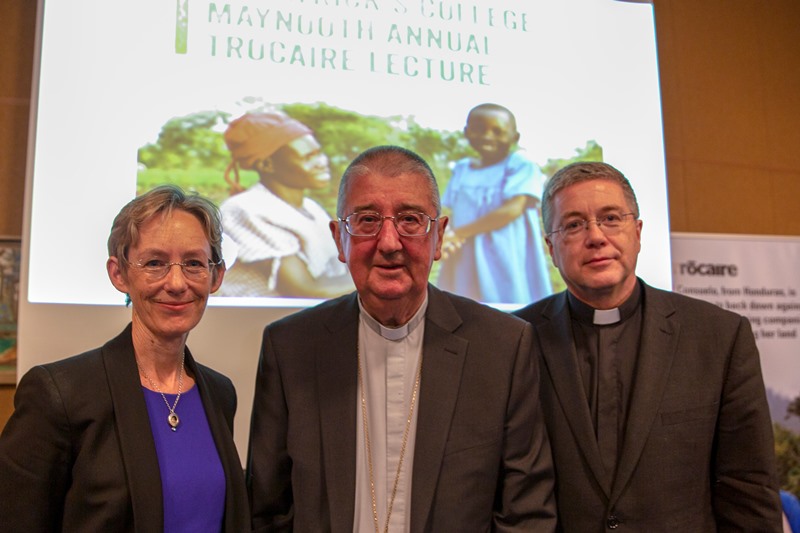Speaking last night in Saint Patrick’s College Maynooth, Archbishop Diarmuid Martin reflected on the social teaching of the Church, and its crucial role in shaping moral consensus on a global scale, as he delivered the annual Trócaire Lenten lecture on the theme ‘At the Service of Justice and Peace’.
At the outset of his address, Archbishop Diarmuid Martin said: “The social teaching of the Church must be in touch with reality. It is, however, not an ideology. Neither is it a political or economic platform.
“The Gospels do not provide readymade answers to the ongoing challenges of a complex world. To affirm otherwise would be fundamentalism.”
Archbishop Martin, who is Archbishop of Dublin and vice-president of the Irish Catholic Bishops’ Conference, referenced his time in a leadership position working with Cardinal Roger Etchegaray in the Pontifical Council for Justice and Peace, one of the few offices of the Holy See explicitly requested by the Second Vatican Council.
The Archbishop said: “Working at the Vatican is an unusual experience. I met there some of the most intelligent, committed and enlightened men and women dedicated to the service of the Church.
“At the Vatican, I also saw the darker and sadder side of Church life in a culture of careerism and nastiness. Cardinal Etchegaray and his successor with whom I also worked, Cardinal Van Thuan, who had been in prison for thirteen years in Vietnam, both belonged unmistakably to that first category and I am deeply indebted to both of them.”
In relation to the initiative of the Pontifical Council for Justice and Peace, the Archbishop said: “The Messages for the World Day of Peace were indicative of the methodology of the Pontifical Council. On 1 January 1969, Pope Paul VI had established the World Day of Peace.
“Paul VI wished to use this occasion to address a wide audience using a language that, though rooted in faith, could be appreciated by people of other beliefs and foster dialogue. This must still today be a mark of the Social Teaching of the Church.”
Speaking on how the social teaching of the Church is not bound to any strict form of political or economic ideology, the Archbishop of Dublin said: “I remember the uproar amid right wing economists in the United States – often Catholic led – when Pope John Paul in the Encyclical Sollicitudo Rei Socialis drew attention to some elements of the socialist system that he felt should not be lost after the end of the cold war. Perhaps his language could have been more nuanced, but to accuse Pope John Paul, as these economists did, of asserting moral equivalence between communism and capitalism was to mistake the man. The neo-liberalism that appeared to have failed has given rise to equally damaging neo-populism.”
Archbishop Diarmuid Martin also highlighted the dangers of the current arms-race, particularly in terms of the increasing armament of middle-eastern countries. He said: “According to SIPRI, the majority of weapons sold by the United States in the last five years (52%) went to one country in the Middle East. The report does not mention it by name, but it refers to Saudi Arabia. Saudi Arabia has become the world’s largest arms importer, with an increase of 192% over the past ten years.
“Organizations like Trócaire can be to the forefront in establishing and sustaining international network campaigns which influence national and international public opinion and show how ethical concerns belong to the real world and that politics and pragmatism can be forced to listen.”
For public opinion to evolve, Archbishop Martin stated, that courageous forerunners are needed to take a principled and uncompromising stand.
He said: “Globalization will be worthy of its name if it enhances the unity of the human family. Any form of globalization that breeds exclusion, marginalization, instability and crass inequality does not have the right to call itself global.”
He stated that the Church is global by its very nature, and that the Church is a sign of the unity of the human race.
The Archbishop of Dublin concluded: “We salute Trócaire and congratulate it for the bonds of unity that it establishes in directing the sense of Christian solidarity of Irish Catholics to help realise the dreams and aspirations of the marginalised. That bond of unity is Church.”
ENDS


